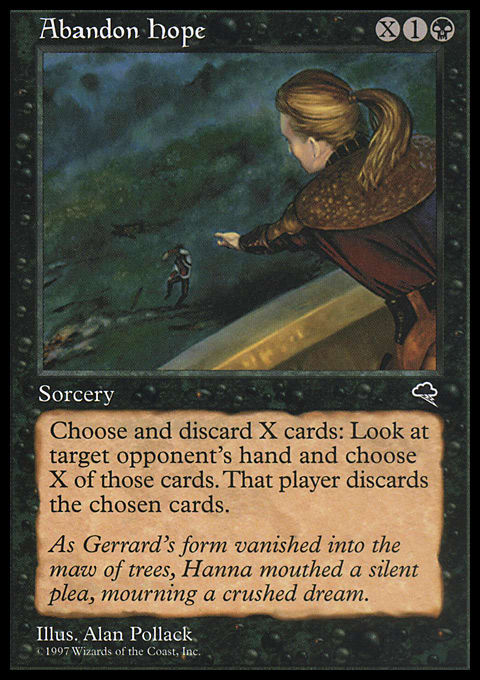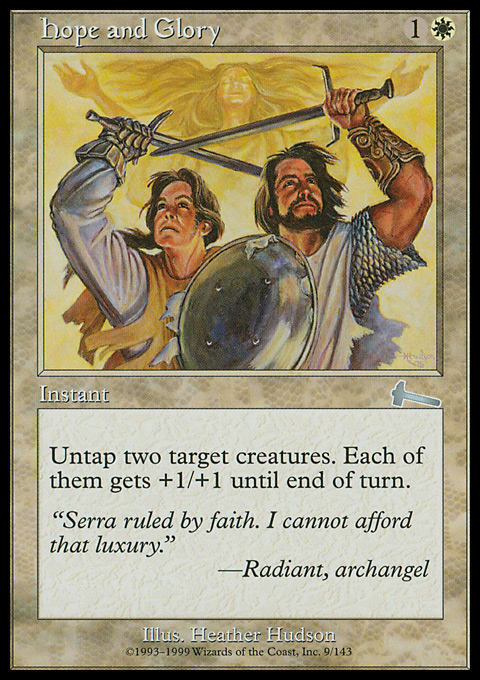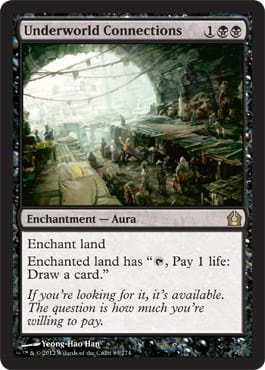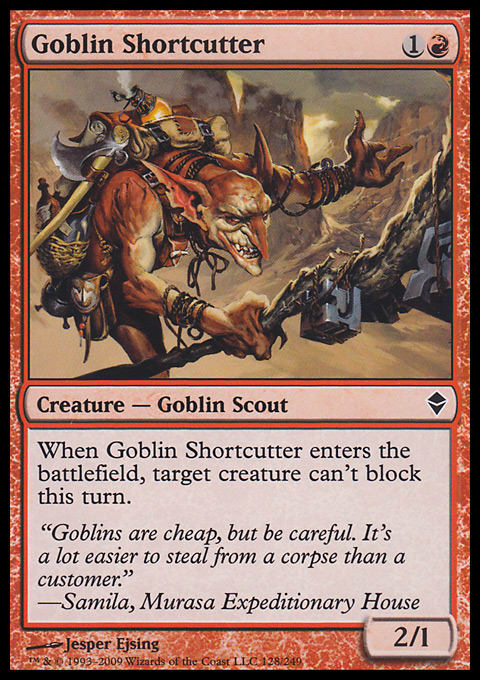A user submitted to i09’s Rob Bricken: What is the nerdiest fandom on the hierarchy of nerds?
There's something about CCGs that breeds kind of an insularity of nerdiness. Maybe because people can be somewhat into comics, buy the occasional collectible, or maybe check out a well-known anime series on Netflix, but with CCGs, you're sort of required to be passionate. You have to learn the rules; if you want to have any chance of competing, you have to have certain cards; and to obtain those, you have to spend a certain amount of money. With CCGs, you're either all-in or you probably shouldn't bother, and the people who tend to go all-in often seem to do so to the exclusion of most everything else. And those who play them do seem to be the most obsessed nerds, the ones whom other nerds can least understand or relate to, and that's why they end up at the bottom.
I feel that I talk about Magic not being Geek-chic on a regular basis, but it’s relevant here again. On one edge of the spectrum, players hide their hobby, unwilling to even leave an opened Pucatrade envelope out on the kitchen table, which moves us into geek shame. This was covered extensively by our own Natasha Lewis Harrington here.
The converse player base plays in parks, in libraries, or—as a coworker and I did—in a hotel bar while at a conference in Phoenix to enjoy the game—in public. People can see you there. Andrew Rogers covered "Taking Magic to Work", as did I with "Magic" at Work for ways to popularize Magic, sure, but also as ways to make the game accessible. Some people are taking it out of stinky basements and into, well, visibility. It’s slow, but it’s happening. That isn’t to say this is a universal problem. If you’re in Seattle, you see Magic quite a lot compared to if you’re in Kansas City.
After reading this i09 article, of an opinion in a major geek news outlet that was uniformly agreed upon as being fundamentally true, it feels as though our community has hit a point at which the problem not only needs to be fixed, but our game cannot progress without such a fix. I didn’t see much of a blip at all on Twitter—barely a peep. If a movie is in our near future and one of the most popular gaming websites poses that a collectible card game (CCG) like Magic has a insularity problem—and many commenters agree that it’s unapproachable—any movie or TV show is doomed to fail. Utterly.
Magic and Connecting and You
I spend a lot of time reading these young professional articles online claiming that weak ties between people are the real movers and shakers of society. The axiom, “It’s not what you know, it’s who you know,” is a very real phenomenon in any job market. I don’t care if you’re in a rural village or a Sim City megalopolis, bypassing barriers for success by simply knowing a friend of a friend seems beneficial. Granted, we don’t need to write about it every two to three months, but some folks just can’t figure it out, so I get it. It’s like the Top 10 “most favorite MTG art” articles. Yes, we get it; you like a shorter list of art. Good for you.
Going back to our issue we have in front of us, I think it’d be smart to show how, in my small way, I do three things every week outside my job to prevent MTG insularity, moving us from bottom-of-the-totem-pole nerds to a celebrated fandom: I write an article for Gathering Magic, I volunteer in some variety, and I have an early-morning coffee with someone.
- Every Sunday, I write one of these articles, after having an outline worked on throughout the week. I try to reach out to folks, asking them for input or advice, whether it’s personally reaching out on Facebook or Twitter, poking someone on the Gathering Magic forum here, or arguing over Google chat on a topic. I’d like to think by being accessible online and talking about different art-making activities across mediums that I can, albeit in a minor way, to helping Magic be more visible. That art on your wall sure can be a jump-off conversation at work; that’s for sure.
- I seem to volunteer a lot. Whether it’s helping in my community with some fundraising event like the Magic one I’m working on currently, acting on a host committee for another gala, or simply offering to help an artist—whether it’s MTG or otherwise—with getting himself or herself together, I end up spending a lot of time with these things. I find fulfillment in helping others, sure, but when someone asks me something, I tend to respond. Now, when I’m demanded to do something, I can ignore it and sometimes do. People take goodness for being free marketing sometimes, and in the Magic community, everyone has something he or she wants pitched.
- Having morning coffees is where this article actually gets to its damn point. I meet with people I find interesting in the community, pick their brains a bit, and then shake hands, and we add each other on LinkedIn.
The final point is what is hammered home: Magic simply does not do well—we don’t connect enough outside the game.
We can play nearly every week in our local gaming stores yet never be invited to a barbecue or even ask what the person across from you does for a living. Too often, unless you’re preparing for a large tournament and in need of playtesting, the extent of friendship really only lives on a Facebook group page that’s terribly moderated and inside a store that smells like Funyuns. There is a crap load of discussion to be had on the deck that delving into what you’ll be naming your kid isn’t exactly paragraph two in conversation.
This has to change.
Connecting Is the New Networking
I won’t use the word networking as something we all should be doing because the word networking needs to die in a fire. In a nutshell, you go to a networking event to pass out business cards for yourself to gain a future thing. There are a hundred bland articles telling you the importance of doing this socially awkward thing that “magically” is important. Thanks, collegiate career center—great vague advice. Networking is a means to an end. It’s someone helping you . . . for some reason that isn’t clear.
Connecting is a one-on-one meeting with someone, asking him or her about himself or herself and then passing things relevant to his or her life to him or her in the future. Connecting is beginning a mutually-beneficial relationship, business or otherwise, in which it makes sense for the two of you to know each other, and sometime down the line, invariably, you’ll become useful in some capacity to each other. Maybe that’s a poor way to describe friendship, but we can’t literally be “friends” with two hundred or more people. We can be colleagues, acquaintances, and connections though. Worst-case scenario, there is no connection, but this loose tie will help someone else, which helps your connection.
Imagine two identical people are on LinkedIn:
- The networked person receives requests from random people.
- The connected person receives requests from people he or she has already met or forwarded from someone with a pre-non-crazy approval.
Think of a Magic employee like our former editor Trick Jarrett. He meets a lot of people at events and tries to keep in contact with everyone, but if they’ve only met digitally, or someone just wanted him as a referral for a job at Wizards, how strong is that tie? Would someone like that ask for a referral? A recommendation? A way to bypass a step of HR?
We, as a gaming subculture, don’t connect. We network, and even then, we don’t do it all that well. I’m allegedly connected to a lot of people on LinkedIn in the gaming world, but can I ask one of them to forward me to one of his or her contacts? Can I be totally sure that person will?
How to Connect
While asking a fellow player to lunch, especially a teenager, it could become super-weird. Social media is a great way to start, and it breaks the barriers of our insular CCG nature. I’d love to have more happy hours with Drafts and Cubes, and some stores are connected to pubs, but it’s a rarity. For example, I don’t know many Warhammer 40k players, but I know a Commander player who has an army, and we keep in touch from time to time over a Facebook message. (That and Minnesota eight-month winters really damper fall and spring barbecues!)
The little things matter, for example:
- Before a match, ask your opponent what he or she does. Student? Self-employed? Married? Remember what he or she says.
- After a match, find something to remind yourself, and connect to it. Students at a large university? How did the local sports-ball team do?
- Find the person on LinkedIn and Twitter. Does he or she talk about things besides Magic? It’s pretty interesting to see someone’s personality online after seeing him or her tilt in a game during which yet another Spellskite is drawn. Often, you’ll find too much info on the person—or just utterly zero. Usually, there’s a reason for both.
- Ask your fellow players to a home Draft. If you bring drinks and some chips and it’s only $8 to $10 for a Draft, what you lose in prize support you gain in experience, and a person in the STEM/IT/whatever field you didn’t know. Add that person on LinkedIn with a message saying, “Janet, was fun to draft with you the other night. I’d love to add you on LinkedIn, get all connected and such. See you at Wizard McPlace LCG soon! Best, Mike.” It’s really that simple.
- Meet one of your players—just one— whom you don’t really know for a coffee or lunch. I’d come with a reason, which may feel like all networky crap, but since it’s often so rare for a geek in the IT field to be asked for a coffee, it’s often welcomed with open arms. A friend of mine forwarded me to a gaming friend of his at the Ordway Center where I work now. We talked to one another and found out he actually plays Magic, and I learned about the company while finding someone at work I can easily relate to. That’s Evan Erwin Magical Christmas Land.
- Help a player find a job, whether it’s a part-time, internship, or full-time position. The feeling is incredibly rewarding. If you have a job opening at your company that’s generally entry-level, post it on your LGS bulletin board. Keep a look out for things that making Friday Night Magic each week would allow.
- Introduce one person to another person. I love forwarding people on. Yes, you can be burned by a crappy person putting on a smile for you and then the person is a muppet for your connection, but it’s rare at best. Connecting for dates would be clutch, sure, but more often, it’ll be for some job situation. For an example, do something like this below, and swap out names with companies and such. That format works incredibly well, being just approachable and writing like an actual human, not some perfectly-written poem.
I want to get you in touch with Frank. He’s one of my gaming buddies and is just finishing up law school. He’s looking in the bio ethics field, and while I know you work in research, I figured, well, maybe you’d meet up with him to learn about your company’s summer associate programs or someone in your dept. He’s a smart guy; you’ll like him. Frank will be following up with you soon.
Jim is a colleague of mine, and we sat on a volunteer board together. He’s good people and is looking forward to hearing from you. I’d e-mail him quick—his schedule will book up fast if you want to meet for a coffee in the morning. Lunch will be harder, but it’s worth a shot.
Best,
-Mike
It’s that simple.
We will be able to break this perception, this wall where Magic doesn’t interact with other fandoms. We aren’t the nerd kid in the basement only. It’s something to fix with community organizing at the store level. Then, we can start finding commonalities in products, events, conventions, and more. (P.S. Magic Con: I have no idea why this doesn’t exist yet.) We can’t make every player shower or be not awkward or learn social cues or dumb down our verbiage—that isn’t possible. Life isn’t a game in which you can find the net deck. Put in time to make your group, our game, more inclusive. Lady Planeswalkers Society is a great example—you start by getting to know your own group, and you then make more groups. We then branch out big. That’ll come later.
-Mike
P.S. I was on the Heavy Meta podcast. Talked art. Wasn’t the worst thing ever.
P.P.S. I’m tabulating the MTG charity info. There are some really eye-opening results!
P.P.P.S. Alpha Original Artworks—if you see them, let me know!































